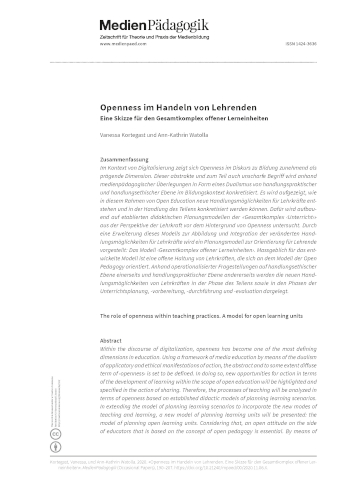Abstract
Within the discourse of digitalization, openness has become one of the most defining dimensions in education. Using a framework of media education by means of the dualism of applicatory and ethical manifestations of action, the abstract and to some extent diffuse term of ‹openness› is set to be defined. In doing so, new opportunities for action in terms of the development of learning within the scope of open education will be highlighted and specified in the action of sharing. Therefore, the processes of teaching will be analyzed in terms of openness based on established didactic models of planning learning scenarios. In extending the model of planning learning scenarios to incorporate the new modes of teaching and learning, a new model of planning learning units will be presented: the model of planning open learning units. Considering that, an open attitude on the side of educators that is based on the concept of open pedagogy is essential. By means of operationalized questions regarding both the applicatory and the ethical manifestations of action, examples for the new opportunities for action within the added phase of sharing as well as the existing phases of planning, preparing, implementing and evaluation teaching units will be presented.
References
Baacke, Dieter. 1997. Medienpädagogik. Tübingen: Niemeyer.
Blömeke, Sigrid. 2000. Medienpädagogische Kompetenz. Theoretische und empirische Fundierung eines zentralen Elements der Lehrerausbildung. München: KoPäd Verlag.
Co-Curate. 2017. Understanding Licenses. https://co-curate.ncl.ac.uk/licenses/.
Cronin, Catherine. 2017. «Openness and Praxis: Exploring the Use of Open Educational Practices in Higher Education». International Review of Research in Open and Distributed Learning 18, Nr. 5: 15–34. https://doi.org/10.19173/irrodl.v18i5.3096.
Deimann, Markus. 2013. «Open Education and Bildung as Kindred Spirits.» E-Learning and Digital Media 10, Nr. 2: 190–99. https://doi.org/10.2304/elea.2013.10.2.190.
Deimann, Markus. 2018. «OER-Forschung – Warum es sie bisher nicht gab und wie sich das ändern kann.» Synergie. Fachmagazin für Digitalisierung in der Lehre Nr. 5: 70-75. https://www.synergie.uni-hamburg.de/de/media/ausgabe05/synergie05-beitrag13-deimann.pdf.
Ehlers, Ulf-Daniel. 2011. «Extending the territory: From Open Educational Resources to Open Educational Practices.» Journal of Open, Flexible, and Distance Learning, Nr. 5(2): 1-10. https://www.learntechlib.org/p/147891/.
Eickelmann, Birgit, und Kerstin Drossel. 2020. «Schule auf Distanz – Perspektiven und Empfehlungen für den neuen Schulalltag. Eine repräsentative Befragung von Lehrkräften in Deutschland.» https://www.vodafone-stiftung.de/umfrage-coronakrise-lehrer/.
Hegarty, Bronwyn. 2015. «Attributes of Open Pedagogy: A Model for Using Open Educational Resources.» Educational Technology, 55 (4), 3-13. https://www.jstor.org/stable/44430383.
Heimann, Paul, Gunter Otto, und Wolfgang Schulz. 1979. Unterricht: Analyse und Planung. 10., unveränderte Auflage. Hannover: Schroedel.
Huber, Stephan Gerhard, und Frederik Ahlgrimm. 2016. «Was Lehrkräfte davon abhält zusammenzuarbeiten – Bedingungen für das Gelingen von Kooperationen.» In PraxisWissen SchulLeitung, hrsg. Adolf Bartz, Maja Dammann und Stephen G. Huber. http://www.bildungsmanagement.net/pdf/PubsHuber/2_4/HuberAhlgrimm-2008-WasLehrkrafteDavonAbhaltZusammenzuarbeitenBedingungen.pdf.
Knutzen, Sönke, und Ronny Röwert. 2020. «(GEM)EINSAM ARBEITEN? – Zusammenarbeit für gute Schulbildung im digitalen Zeitalter ». Impulspapiere, Forum Bildung Digitalisierung. https://magazin.forumbd.de/ausgabe01/gemeinsam-arbeiten-zusammenarbeit-fuer-gute-schulbildung-im-digitalen-zeitalter/.
Kultusministerkonferenz. 2012. Medienbildung in Schule: Beschluss der Kultusministerkonferenz vom 08.03.2012. https://www.kmk.org/fileadmin/Dateien/pdf/PresseUndAktuelles/2012/Medienbildung-08-03-2012.pdf.
Kultusministerkonferenz. 2017. «Strategie der Kultusministerkonferenz. Bildung in der digitalen Welt» Beschluss der Kultusministerkonferenz vom 08.12.2016 in der Fassung vom 07.12.2017. https://www.kmk.org/fileadmin/Dateien/veroeffentlichungen_beschluesse/2018/Strategie_Bildung_in_der_digitalen_Welt _idF._vom_07.12.2017.pdf.
Mayrberger, Kerstin. 2020. «Partizipative Mediendidaktik: Darstellung von Eckpunkten und Vertiefung des Partizipationsraums als konstituierendes Strukturelement». MedienPädagogik: Zeitschrift für Theorie und Praxis der Medienbildung 17 (Jahrbuch Medienpädagogik), 59-92. https://doi.org/10.21240/mpaed/jb17/2020.04.26.X.
Muuß-Merholz, Jöran. 2015. UNESCO veröffentlicht neue Definition zu OER (Übersetzung auf Deutsch). www.open-educational-resources.de – Transferstelle für OER. https://open-educational-resources.de/unesco-definition-zu-oer-deutsch/.
OPAL. 2011. OEP Guide: Guidelines for Open Educational Practices in organisations. Open Education Quality Initiative (OPAL). http://oerworkshop.pbworks.com/w/file/fetch/44605120/OPAL-OEP-guidelines.pdf.
Peterßen, Wilhelm H. 2000. Handbuch Unterrichtsplanung. München: Ehrenwirth.
Peterßen, Wilhelm H. 2003. Lehreraufgabe Unterrichtsplanung: das Weingartner Planungsmodell. München: Oldenbourg Wissenschaftsverlag.
Pomerantz, Jeffrey, und Robin Peek. 2016. «Fifty shades of open». First Monday (21), Nr. 5. https://doi.org/10.5210/fm.v21i5.6360.
Riedl, Alfred. 2004. Grundlagen der Didaktik. Wiesbaden: Franz Steiner Verlag.
Rolff, Hans-Günter. 2016. Schulentwicklung kompakt. Modelle, Instrumente Perspektiven 3., vollst. überarbeitete und erweiterte Aufl. Weinheim; Basel: Beltz.
Schorb, Bernd. 2005. «Medienkompetenz». In Grundbegriffe Medienpädagogik, hrsg. von Jürgen Hüther und Bernd Schorb, vollst. neu konzipierte Aufl. München: kopaed.
Schulz, Wolfgang. 1981. Unterrichtsplanung. Mit Materialien aus Unterrichtsfächern. München, Wien, Baltimore: Urban und Schwarzenberg.
Shah, Nishant. 2017. «Open Politics and Education». In Encyclopedia of Educational Philosophy and Theory, hrsg. von Michael Peters. Singapore: Springer. https://doi.org/10.1007/978-981-287-588-4_221.
Sliwka, Anne, und Britta Klopsch. 2020. «Disruptive Innovation! Wie die Pandemie die „Grammatik der Schule“ herausfordert und welche Chancen sich jetzt für eine „Schule ohne Wände“ in der digitalen Wissensgesellschaft bieten». In „Langsam vermisse ich die Schule ...“. Schule während und nach der Corona-Pandemie, hrsg. von Detlef Fickermann und Benjamin Edelstein, 216-229. https://doi.org/10.31244/9783830992318.14.
Soltau, Andreas. 2011. «Isolation aus Unsicherheit? Berufliche Unsicherheiten bei Lehrkräften und deren Zusammenhang zur Lehrerkooperation» Dissertation. Universität Bremen. https://d-nb.info/1071898639/34.
Weller, Martin. 2014. The battle for open. London: Ubiquity Press Ltd. https://doi.org/10.5334/bam.
Wiley, David. 2006. «Open Source, Openness, and Higher Education». Innovate: Journal of Online Education, Nr. 3(1), https://www.learntechlib.org/p/104321/.
Wiley, David. o.J. Defining the „Open“ in Open Content and Open Educational Resources. http://www.opencontent.org/definition/.

